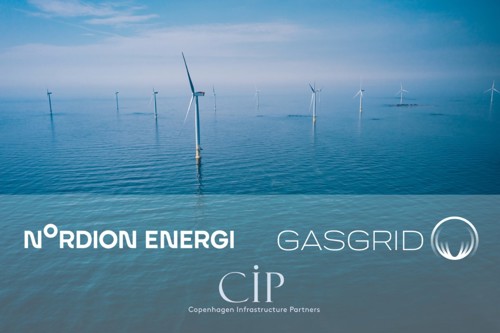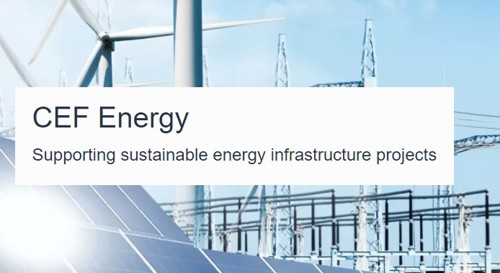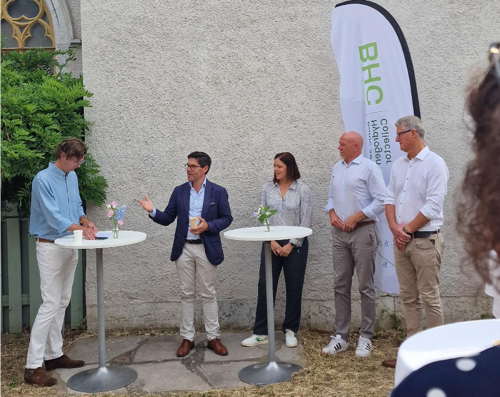Leading infrastructure and industry companies Gasgrid Finland, Nordion Energi, OX2, and Copenhagen Infrastructure Partners are taking concrete steps to realise the European Hydrogen Backbone vision, developed by 31 gas infrastructure companies, in the Baltic Sea region. The companies have agreed to investigate the possibility to develop new large-scale offshore hydrogen pipeline infrastructure connecting Finland, Sweden, and Central Europe by 2030 to provide clean, sustainable hydrogen for Europe.
There is a significant potential for production and use of hydrogen in countries surrounding the Baltic Sea as well as for developing offshore wind and hydrogen production. The Baltic Sea region has excellent conditions for the production of onshore and offshore wind energy. With strategic investments in the infrastructure, renewable energy, and hydrogen production, up to 55% of the clean hydrogen target defined in the REPowerEU Plan can be produced in the region simultaneously supporting innovative decarbonization projects within each country as well as helping the EU to meet its overall goals.
In the energy field and in response to Russian aggression, the prime ministers of eight states surrounding the Baltic Sea signed The Marienborg Declaration in August 2022. The declaration includes high-level political commitment to explore joint cross-border renewable energy projects and identify infrastructure needs. Therefore, they set combined ambitions for offshore wind in the Baltic Sea region of at least 19.6 GW by 2030. The Marienborg Declaration recognizes substantial potential for offshore wind power in the Baltic Sea basin, reaching up to 93 GW.
The European Hydrogen Backbone (EHB) initiative aims to accelerate Europe’s decarbonisation journey by defining the critical role of hydrogen infrastructure – based on existing and new pipelines – in enabling the development of a competitive, liquid, pan-European renewable, and low-carbon hydrogen market. Development of hydrogen infrastructure will be a prerequisite for renewable hydrogen market creation and market integration. Therefore, Finnish and Swedish gas transmission system operators (TSOs) Gasgrid Finland and Nordion Energi have, together with industry companies OX2 and Copenhagen Infrastructure Partners, launched a project called the Baltic Sea Hydrogen Collector (BHC).
BHC is an offshore pipeline project that will connect mainland Finland and Sweden with Finnish Åland island and Germany by 2030. The offshore project may also be connected to other energy islands in the region such as Gotland and Bornholm in Sweden and Denmark.
The aim of the Baltic Sea Hydrogen Collector is to unlock the significant offshore wind potential, in Bothnia Bay and Baltic Sea region, creating a booming hydrogen market and connecting both supply and demand.
BHC has a critical role in creating an efficient, harmonised, and integrated hydrogen market in Europe. It offers solutions to the collection, storage, and transportation of green H2, providing market integration and a solution to maintain balance in the energy system. It enables making the offshore wind energy in the region a secure and flexible energy source, increasing system resilience, energy independence, and security of supply. It will also support decarbonization of hard-to-abate sectors and green industrialization in the Nordics, Baltics, and Central Europe.
By creating a guaranteed route from production to use, the Baltic Sea Hydrogen Collector provides confidence to green H2 producers and users to invest in the new hydrogen value chains and partake in supplying the rising green H2 demand in Europe.
Company background and media inquiries:
Gasgrid Finland Oy is a Finnish state-owned company and transmission system operator with system responsibility. We offer our customers safe, reliable, and cost-efficient transmission of gases. We actively develop our transmission platform, services, and the gas market in a customer-oriented manner to promote the carbon-neutral energy system of the future. Find out more: www.gasgrid.fi/
Contact: Sara Kärki, Gasgrid Finland, Head of Strategic analysis & RDI, sara.karki@gasgrid.fi, +358401581722
Nordion Energi specialises in energy infrastructure and is driven by a clear ambition: to be part of driving the transition to 100% green energy. Nordion Energi is the TSO (Transmission System Operator) for the Swedish main gas grid and owns and operates the country’s biggest gas distribution network and also has electricity network operations. Nordion Energi ensures our customers such as industries, municipalities, CHP plants, households, filling stations and restaurants are always supplied with energy in a safe, sustainable way.
Contact: Saila Horttanainen, Nordion Energi AB, Director of Communications, Nordion Energi AB, saila.horttanainen@nordionenergi.se, tel. +46706227606
OX2 develops, constructs, and sells onshore and offshore windfarms and solar PV farms. OX2 also offer management of wind- and solar farms after completion. OX2’s project development portfolio consists of in-house developed as well as acquired wind and solar projects in various phases of development. The company is also active in developing projects based on other renewable energy technologies, such as hydrogen and energy storage. OX2 is operating on ten markets in Europe: Sweden, Finland, Estonia, Lithuania, Poland, Romania, France, Spain, Italy and Greece. Sales in 2021 was about 5 billion SEK. The company has about 350 employees and is headquartered in Stockholm, Sweden. OX2 is listed on Nasdaq Stockholm since 2022. www.ox2.com
Contact: Edvard Lind, OX2, Communication, press@ox2.com, +46(0)727271117
Copenhagen Infrastructure Partners
Founded in 2012, Copenhagen Infrastructure Partners P/S (CIP) today is the world’s largest dedicated fund manager within greenfield renewable energy investments and a global leader in offshore wind. The funds managed by CIP focuses on investments in offshore and onshore wind, solar PV, biomass and energy-from-waste, transmission and distribution, reserve capacity and storage, and Power-to-X.
CIP manages ten funds and has to date raised approximately EUR 19bn for investments in energy and associated infrastructure from more than 135 international institutional investors. CIP’s will accelerate its role in the global energy transition and aim to have EUR 100bn euros under management in green energy investments in 2030. CIP has approximately 300 employees and offices in Copenhagen, London, Hamburg, Utrecht, New York, Tokyo, Singapore, Seoul, and Melbourne. For more information, visit www.cip.dk
Contact: Oliver Routhe Skov, Vice President, Head of Media Relations and Project Communications, orsk@cisk.dk, +4530541227








